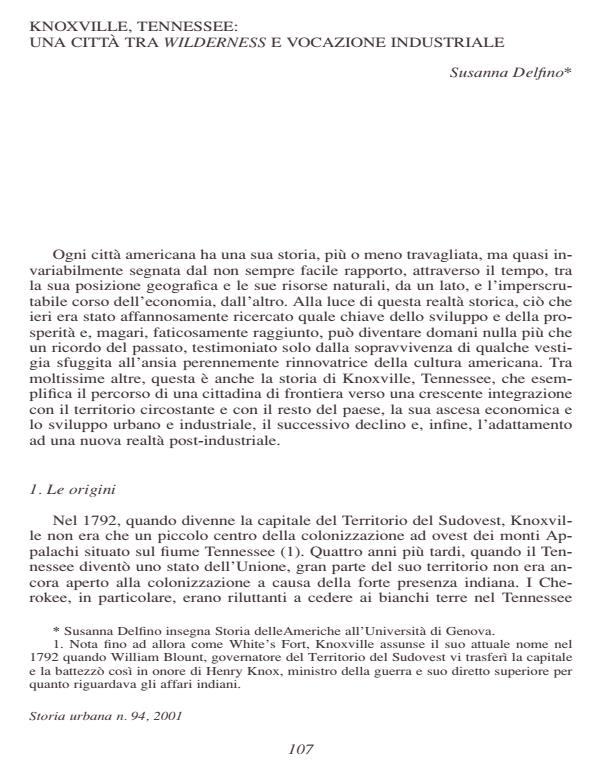Knoxville, Tennessee: una città tra wilderness e vocazione industriale
Titolo Rivista STORIA URBANA
Autori/Curatori Susanna Delfino
Anno di pubblicazione 2002 Fascicolo 2001/94
Lingua Italiano Numero pagine 22 P. Dimensione file 86 KB
DOI
Il DOI è il codice a barre della proprietà intellettuale: per saperne di più
clicca qui
Qui sotto puoi vedere in anteprima la prima pagina di questo articolo.
Se questo articolo ti interessa, lo puoi acquistare (e scaricare in formato pdf) seguendo le facili indicazioni per acquistare il download credit. Acquista Download Credits per scaricare questo Articolo in formato PDF

FrancoAngeli è membro della Publishers International Linking Association, Inc (PILA)associazione indipendente e non profit per facilitare (attraverso i servizi tecnologici implementati da CrossRef.org) l’accesso degli studiosi ai contenuti digitali nelle pubblicazioni professionali e scientifiche
Knoxville, Tennessee, exemplifies the course of an American frontier town to regional and interregional economic integration, urban and industrial development, subsequent decline and, finally, adaptation to a new post-industrial reality. Born as a small commercial post in the wilderness, the Appalachian town acquired growing importance from 1792 when it became the capital of the Southwest Territory. The early development of an industrial vocation among its inhabitants led to the emergence of Knoxville as an important iron-making centre by the time of the Civil War. Despite expectations, however, the expansion of Knoxville as an industrial centre, which was signalled, in the 1850s, by the rise of the thriving industrial district of Mechanicsville, began to wither from the 1910s. The reasons for this decline must be looked for in the ambivalent and difficult relationship between the new challenges and growing demands of the economy at large and an Appalachian culture of separateness and resignation. Moreover, the uniqueness of Knoxville - and its Mechanicsville - as a workshop of interracial integration in the upper South, initially an asset in its process of industrialization, was lost in the wake the of mounting racism, with attendant residential and job segregation, which pervaded the United States in the early decades of the XX- century.
Susanna Delfino, Knoxville, Tennessee: una città tra wilderness e vocazione industriale in "STORIA URBANA " 94/2001, pp , DOI: